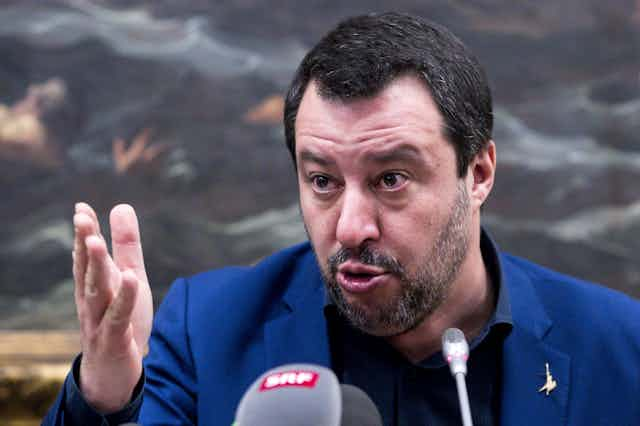Matteo Salvini, Italy’s interior minister and deputy prime minister, has avoided facing trial for kidnapping thanks to an online vote by members of the Five Star Movement. But this surprising situation has exposed the fissures that lie just below the surface for the Italian government.
Salvini’s League came to power in June 2018 after striking an unlikely coalition deal with the populist Five Star Movement (M5S). Their government promised radical change. Yet the Italian economy is now battling a worrying recession. It has experienced two consecutive quarters of negative growth. And, just like in Silvio Berlusconi’s time, the government is facing legal turmoil.
Although the specific charges and the actors involved are very different this time, it is striking that the broader picture has not changed much. Economic uncertainty and tensions between judiciary and executive still dominate the news. They also threaten to further destabilise Italy’s already fragile political system.
Kidnap charges
At the end of January, prosecutors in Catania, Sicily, asked the Italian Senate to authorise a trial against Salvini. They wanted to bring charges against him for kidnapping and detaining 177 migrants by refusing to let them disembark from their ship when it docked in Catania seeking refuge in August 2018. Salvini had refused to accept the arrivals while he tried to negotiate with the EU to get other member states to take them in.
Immediately following the incident in Catania, tensions began to emerge within the M5S. Its leader Luigi Di Maio – who is also deputy prime minister – openly supported Salvini. However, other factions within the movement were critical of how Salvini handled the crisis. They included the M5S wing most closely affiliated with Roberto Fico, the president of the lower chamber.
When the prosecutors officially requested authorisation from parliament to proceed against Salvini, the MS5 faced a major dilemma. It would be MS5 senators who would have the deciding vote on whether to lift Salvini’s immunity so that he would be forced to face the trial.
Had this vote taken place two years ago, the M5S senators would have almost certainly voted in favour of lifting the immunity without much debate. Their political conviction that judges should be trusted more than politicians would have prevailed (the term giustizialismo is used to define this almost unconditional support for the judiciary). After all, the M5S has long regarded parliamentary immunity as the ultimate embodiment of the political elite’s lack of accountability.
Today, however, the situation is very different. For M5S, the League is both an ally and a rival. Its leaders are torn between adopting a more confrontational approach and protecting the stability of a government in which they have invested most of their political capital.
Online poll
When faced with questions like this, the M5S takes an interesting approach. Its leaders resort to web democracy to find a way out of political impasses. In this case, that has meant inviting M5S members to vote in an online poll to decide whether their senators should vote to strip Salvini of his immunity.

This kind of process was initially portrayed as a political revolution. Citizens would be able to directly participate in key decision-making processes. However, web democracy has gradually become an instrument for legitimising the hard choices that have to be made by M5S leaders – particularly when they are about to contradict some of the founding principles of the movement. This time, the vote was used to challenge the movement’s core idea that politicians should not be shielded from judicial scrutiny.
Many members, including M5S leader Beppe Grillo, complained that the question asked in the online poll was ambiguous. The voting process was also marred by technical problems and the poll was closed more than an hour later than planned. The eventual result was decided by 59% of members voting to allow Salvini to keep his immunity. M5S senators voted accordingly the next day and Salvini will avoid trial. Nevertheless, some M5S members of parliament openly criticised the decision.
Eyes on Brussels
A vote in favour of Salvini’s trial would have seriously compromised the stability of the government just three months ahead of the European elections. Both M5S and the League are using the election as an opportunity to campaign against EU institutions and Emmanuel Macron’s pan-European liberal project. A governmental crisis would have forced them to reframe their political discourse.
That said, it is likely that the M5S will pay a price for its decision to support Salvini in this case. Internal criticism towards Di Maio’s leadership is growing. The senate vote is seen as the last of a series of costly political concessions aimed at preserving a coalition that is not fully delivering on the movement’s promises. On the other hand, Salvini has been much more assertive in setting his red lines and priorities (although they have not always translated into concrete legislative acts).
The electoral trajectories of two parties have been diverging for months – as suggested by opinion polls. The recent regional election in Abruzzo (held on February 10) saw the League become the largest party in a southern Italian region for the first time. It doubled its share of the vote in less than one year. The M5S, meanwhile, lost half its electoral support. It performed even worse than in the 2014 election, when it was badly defeated by the centre-left Democratic Party.
Saving Salvini enables Italy’s coalition government to continue for now – but this case has exposed the fault lines that could cause serious disruption in the long term.

